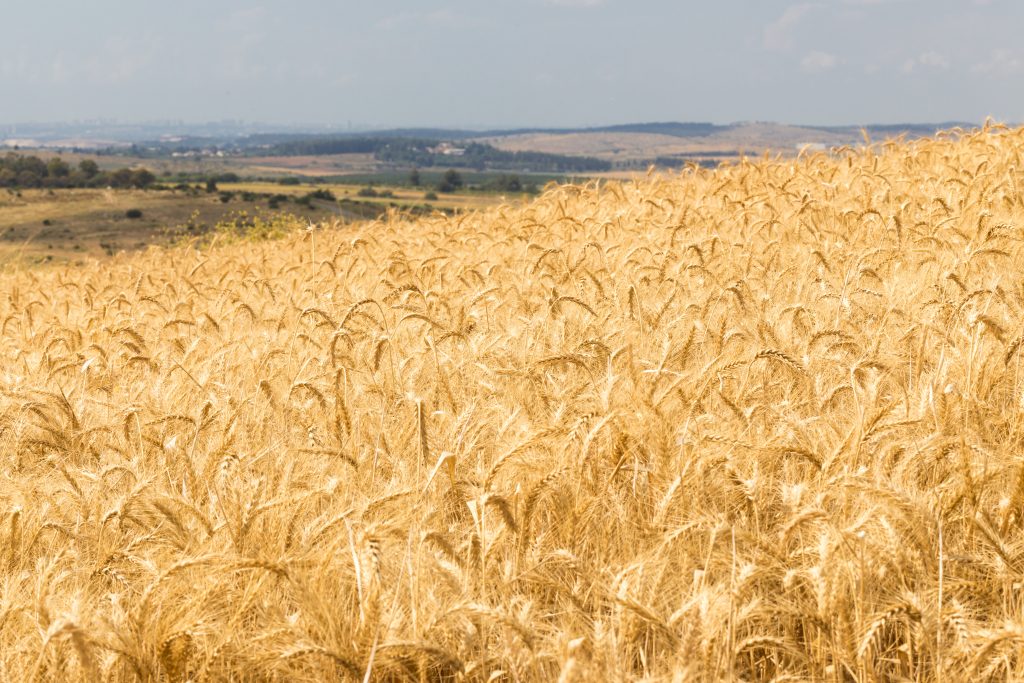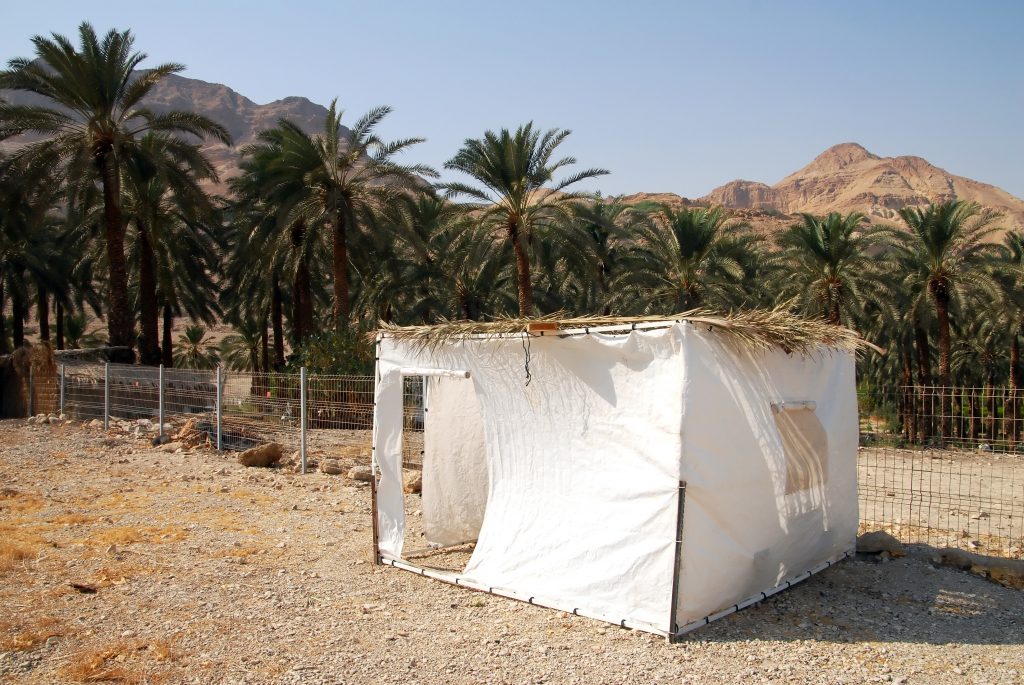A Guide to First Fruits in the Bible
The Apostle Paul calls Jesus the first fruits of those who have fallen asleep. Thanks to Jesus’ resurrection, we can see the prophetic significance of the three main Jewish holidays. There is much we can learn about first fruits in the Bible.
On the outskirts of the old city walls in Jerusalem, close to where Solomon’s temple once stood, there is a beautiful garden. Fruit trees and flowers grow year-round, lovingly tended by volunteers from around the world.
On the north side of the garden, there is a cliff face with inset features. They give the cliff a distinct appearance of a giant skull. And then, a short walk from the cliff to the south is an empty tomb, dating from the first century.
The case that the Garden Tomb is the authentic location of the crucifixion, burial and resurrection of Jesus, is certainly very compelling, whilst not established beyond doubt.
As I sit writing this article in my Jerusalem apartment, I am barely a mile or two from the site of the resurrection! It is the place where everything changed and a new chapter of the relationship between God and humanity began. It is a remarkable and humbling thought.

The Significance of Firsts
On the day of the resurrection in Jerusalem, Jesus became what Paul describes in 1st Corinthians as “the First Fruits of those who have fallen asleep” (1 Corinthians 15:20). First Fruits is a biblical festival celebrating the first harvest of crops and it is the second of three annual pilgrimage festivals.
But what does this ancient agricultural festival have to do with the resurrection of Jesus?
We all know that “firsts” are special. I’m sure we can all remember significant firsts in our lives such as our first car, our first home, and our first date. Firsts are significant to God too – and First Fruits is a phrase loaded with biblical significance.
In Exodus 4:22, God calls Israel his “first born son”. As His firstborn, the Israelites were commanded to honor God by bringing “the best of the first-fruits of your soil to the house of the LORD your God” (Exodus 23:19).
First Fruit in the Bible at Passover
This is the first and perhaps most obvious meaning of First Fruits in the Bible. It is giving back from the best of what we have as a thank offering and declaration of faith.
By using the term to describe Jesus, Paul is letting us know that God gave His best for us, He did not hold back. Paul links First Fruits to Jesus’ resurrection, and by doing so implies that it would be of life-altering significance in world history.
Passover commemorates the time the children of Israel were saved from death by the blood of an innocent lamb. It is no coincidence that Jesus’ death and resurrection took place on Passover.
We too are saved by the blood of an innocent lamb – Jesus’ blood.
And Passover is followed closely in the calendar by another major holiday. And interestingly enough, one of its names is First Fruits.

Diving Deeper at Shavuot
In the Hebrew culture, first fruits are often associated with Shavuot (Hebrew for Weeks), which takes place in late spring. During this festival in Biblical times, Jews from other regions would travel to the temple in Jerusalem to celebrate.
As a part of these “First Fruits”, the Jewish teachers say, God gave the children of Israel the Ten Commandments and the Law of Moses. They also see these first fruits as God giving mankind His best.
This is perhaps the most significant event in the history of the Jewish people.
The giving of the law at Sinai has shaped Jewish identity, religious practice and culture for thousands of years since. In fact, Shavuot today is known primarily not as an agricultural festival but as the “birthday of the Torah (law)”.
As we’ll explore next, this Festival of “First Fruits” not only plays a key role in ancient Jewish history. But it is also instrumental in the founding of the church in the New Testament. This is a fascinating and core component of first fruits in the Bible.
There are dramatic parallels between the biblical festival of Shavuot and the New Testament events that took place at the time of its celebration.
The Exchange at Sinai
Moses’ giving of the law on Sinai at the time of the Feast of Weeks was accompanied by fire from heaven. So, too, as the Spirit fell in the upper room. The disciples spoke supernaturally in foreign languages, whilst tongues of fire descended upon their heads. (Acts 2:3)
Secondly, on the day Moses came down from the mountain, three thousand Jewish souls were slain for their sin (Exodus 32:28). In contrast, on the day of Pentecost (Shavuot), weeks after Jesus’ resurrection, three thousand Jewish souls were saved from their sin!
First Fruits in the Bible: The Gospel Spreads
The pilgrimage to dedicate first fruits at this time was the reason why so many Jews happened to be in Jerusalem. Therefore, First Fruits played a key role in the early spread of the Gospel. These early converts heard Peter declare that the barrier between God and man had come down forever.
With Jesus’ resurrection combined with the outpouring of the Spirit, First Fruits turned into a message of the endless fountain of God’s grace.

“All Israel Saved” at Sukkot
Sukkot, known in English as the Feast of Tabernacles, is the festival of the last harvest of the year. It invites us to remember that First Fruits is just that – only the first!
During Sukkot, which we could call “Last Fruits”, God commanded the Israelites to live for a week in temporary outdoor dwellings. This tradition is followed to this day by the Jewish people all over the world, but most notably in Israel.
Once a year the streets of Jerusalem and other towns fill with small booths covered in palm branches known as Sukkahs.
These temporary dwellings remind us that this world of struggle, sickness and pain is not our ultimate home. Just as God brought Jesus back to life at First Fruits, and poured out His Spirit weeks later, He will return for us in fulfillment of the Last Fruits.
Paul reminds us that the last harvest will be far greater than any past “fruits”, and that eventually “all Israel will be saved” (Romans 11:26).
Redemption, Grace and Hope
The three pilgrimage festivals beautifully illustrate the common thread of redemption, grace and future hope. God has woven them throughout the story of humanity.
Perhaps First Fruits in the Bible’s ultimate significance is in pointing us to the example of God giving His best for us. He did so by laying down the life of His only Son in our place, and then raising Him back to life.

Until Jesus returns, we are to be busy as laborers in the harvest field (Luke 10:2). We echo God’s example by giving our best, our first fruits, by laying down our lives for one another. The first disciples needed the outpouring of the Spirit to build the early church. In the same way so do we, in order to give our first fruits.
Only with the Spirit’s indwelling power can we sow seeds of life in people’s hearts. That is how we will play a role in God’s salvation story.
As Jesus said in John 15: “Whoever abides in me, and I in him, it is he that bears much fruit, for apart from me you can do nothing” (John 15:5).
Have you ever wondered how Israel, Passover, and the Resurrection connect in the Bible?
Discover why they bless the heart of God and reveal a mosaic of His faithfulness in this 30-day Bible Reading Plan we designed just for you.

A Simple Guide Through the Biblical Holidays: Free PDF Download
You may know them as the “Jewish holidays,” but did you know the Bible calls them “Feasts of the LORD”?
We’ve put this guide together for you so that you have all you need to know about these holidays that God calls His own.
Articles Related to First Fruits: The Jewish Holiday and Jesus’ Resurrection
Estimated reading time: 7 minutes
